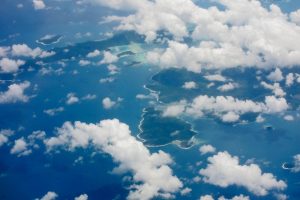Indonesia’s parliament will soon ratify a landmark agreement with Vietnam on the demarcation of their exclusive economic zones (EEZs) in the South China Sea, according to a report published yesterday by Reuters.
Nico Siahaan, a lawmaker in the parliamentary commission overseeing the agreement, said that the parliament and the government “would formally agree to ratify it on Monday, with the actual ratification set for that week or the following week,” the news agency’s report stated.
Indonesia and Vietnam have overlapping EEZ claims in the waters surrounding the Natuna Islands, which have caused periodic bilateral frictions, particularly regarding illegal fishing operations. The two countries finalized the agreement in late 2022, but it has yet to be ratified by either country’s legislature.
The Indonesian parliament’s ratification has been expected since March, when To Lam, the head of the Communist Party of Vietnam, paid a state visit to Jakarta to mark the 70th anniversary of diplomatic relations between the two nations. On that occasion, President Prabowo Subianto declared that Indonesia planned to ratify the agreement after Eid al-Fitr, expressing confidence that the deal would “bring prosperity to both our peoples.” Lam’s visit also saw the two nations raise their diplomatic relationship to the level of a Comprehensive Strategic Partnership.
The agreement was the fruit of 12 years of complex negotiations, in which the two sides have “struggled to reconcile fundamentally different legal approaches,” as Antonio De Santis of Italy’s Istituto Analisi Relazioni Internazionali wrote in March. After agreeing on the Indonesia-Vietnam continental shelf boundary in 2003, Vietnam initially wanted to use the same boundary to delineate their EEZs, while Indonesia proposed using a median line between Natuna Besar island and Vietnam’s Con Dao island. The final agreement, which saw the two sides agree to use separate measurements for their continental shelf and EEZ boundaries, represented a “significant compromise.”
By settling a long-standing dispute over the nations’ overlapping maritime territories on the basis of the U.N. Convention on the Law of the Sea (UNCLOS), the agreement will facilitate maritime law enforcement efforts, and help avoid the sorts of misunderstandings that have been periodic irritants between Indonesia and Vietnam. Prior to the finalization of the agreement, “differing interpretations of where their EEZs overlapped had led to conflicts” over illegal fishing, Bich Tran, an adjunct fellow at the Center for Strategic and International Studies (CSIS), wrote in early 2023. These manifested in the dramatic destruction of fishing boats, including those from Vietnam, by the Indonesian Ministry of Maritime Affairs and Fisheries under Susi Pudjiastuti.
The agreement could also pave the way for Indonesia to exploit the large natural gas deposits that lie around the Natuna Islands. These include the Tuna Block, which sits in Indonesia’s EEZ approximately 140 nautical miles north of Natuna Besar, close to the new border with Vietnam’s EEZ, and the East Natuna gas field.
Then there are the broader ramifications for the disputes in the South China Sea, where China’s expansive “nine-dash line” claim clashes with those of Vietnam, Malaysia, the Philippines, Brunei, and Indonesia (although Jakarta does not view itself as a formal claimant.)
So far, the unresolved disputes between Southeast Asian claimants have complicated their ability to present a common front of opposition to China’s claims. By providing an example of a compromise grounded in international maritime law (i.e. UNCLOS), the Indonesia-Vietnam agreement could provide a template for similar agreements between other regional governments, and open the way to a more harmonized regional approach to maritime and territorial disputes.
“The more Southeast Asian states show their commitment to UNCLOS principles, norms, and rules, the more the region can demonstrate agency and resist China’s bold claims and actions in the South China Sea and beyond,” Bich Tran argued in 2023.
Last year, Vietnam and the Philippines both announced that they are ready to negotiate overlapping continental shelf claims in the South China Sea, after the Philippines asked a U.N. body formally to recognize the extent of its undersea continental seabed in the Spratly Islands.

































